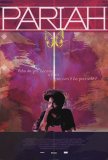Pariah (United States, 2011)
January 02, 2012
Pariah is obviously heartfelt, and is clearly a subject close to writer/director Dee Rees' heart; this is a remake/expansion upon a 2007 short film she made (with most of the same cast). The movie boasts an honest, unfettered performance by Adepero Odye, but the actress is not well served by the screenplay, which hammers home its message with sledgehammer subtlety, or the style, which interferes with the character's emotional truth by tarting up the images with artifice. The movie's point, which is impossible to miss, is that it's hard being black & gay in America and, while there's undoubtedly truth in that sentiment, it doesn't necessarily make for a compelling motion picture circa 2011.
Pariah focuses on 17-year old Alike (Odye), who isn't the least bit confused about her sexuality. She's a lesbian and never wrestles with the question of why she doesn't like boys. At the movie's start, she's also a virgin - a "condition" her best friend, Laura (Pernell Walker), is trying to alleviate (although not with her - she wants to find a girlfriend for Alike). Alike's home life is unsettled and, as far as her mother, Audrey (Kim Wayans), and father, Arthur (Charles Parnell), are concerned, she's still in the closet. Audrey is not happy with the way her daughter's life is going - she suspects her daughter isn't straight but doesn't want to believe it - so she encourages a friendship between Alike and "good girl" Bina (Aasha Davis). Unfortunately for Audrey's God-fearing intentions, Bina is in a "bi-curious" phase. Eventually, the truth about Alike's sexuality comes out and she must cope with a lot of home drama - rejection by her hyper-religious mother, regrets expressed by her father, and bewilderment from her sister. This leads to an inevitable catharsis, some poetry, and a refrain ("I am not running; I am choosing").
It's impossible to deny the kernel of truth that Pariah expresses, although Rees does her best to camouflage it beneath cinematographic chicanery and an overcooked screenplay. The film's look is a constant distraction, with filters being used to enhance colors, intentionally odd shot selections, and a "grittiness" that is intended to trumpet the movie's indie credentials. Light levels are constantly low; Rees wants us squinting through the movie as if we're wearing 3-D glasses. The intention of this "artistic" approach is to provide a window into Alike's world, which is sunken in shadow with only rare glimpses of sunlight. The reality is the opposite - we are consistently aware that we're watching a movie; it's a barrier to immersion.
Pariah is set in modern-day New York, although the time and place are largely irrelevant. This isn't a Woody Allen movie where the city is a supporting character. The attitudes toward homosexuality are a couple of decades out of phase with the "enlightened" mainstream attitude of 2011, reminding us that segments of society (especially those with strong religious components) are still stridently anti-gay. The problem with the way Pariah depicts this is that it relies heavily on cliché and caricature. Audrey never seems like a real person; she's a writer's construct who acts as she does because her over-the-top reactions are necessary to move forward the narrative. Audrey stands out in stark contrast with Arthur, who is a more sympathetic, believable individual.
Perhaps Rees is too close to the material. Pariah boasts intensity and passion but lacks narrative coherence. Watching it, I was reminded of Precious, a similar sort of movie with a stronger storyline. Like Pariah, Precious is about an outsider attempting to find her own voice (also through her writing) and to navigate a rocky, uncertain relationship with her mother. Where that movie was tough, heart-wrenching, and ultimately uplifting, this one feels often feels like it's going through the motions as it follows a predictable formula. The stakes are as high, but Pariah fails to engage on the same emotional level. Odye's performance is great, but the movie as a whole is ordinary. It "says" something but the way it chooses to frame its message is artificial. I was reminded of '80s TV movies about how unmarried girls were received by their families upon revealing a pregnancy. Pariah is a fairy tale for young lesbians - an account of how, by pushing through pain and rejection, they can achieve a better life. Laudable as that may be, it doesn't make for great cinema. It's a niche drama that will not play as well outside a small, specific circle as within it.
Pariah (United States, 2011)
Cast: Adepero Odye, Pernell Walker, Aasha Davis, Charles Parnell, Sahra Mellesse, Kim Wayans
Screenplay: Dee Rees
Cinematography: Bradford Young
Music:
U.S. Distributor: Focus Features
U.S. Release Date: 2011-12-28
MPAA Rating: "R" (Profanity, Sexual Content)
Genre: DRAMA
Subtitles: none
Theatrical Aspect Ratio: 1.85:1
- (There are no more better movies of Adepero Odye)
- (There are no more worst movies of Adepero Odye)
- (There are no more better movies of Pernell Walker)
- (There are no more worst movies of Pernell Walker)
- (There are no more better movies of Aasha Davis)
- (There are no more worst movies of Aasha Davis)

Comments